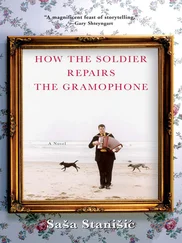She held up a hand to stem his words. “I understand.”
And she did. Pierre could likely go on for a quarter hour listing Citizen Belanger’s tenants and why each of them needed an extra bit of help. It certainly explained how he had three men waiting to become tenants in a country where all able-bodied men were off at war.
What murderer hired one-armed men, cripples and widows?
What murderer helped needy people with food?
She turned back toward the path that ran along the edge of the field. Maybe now she had evidence enough to give Alphonse’s man.
Chapter Seven
Jean Paul bent over the green-and-amber-tinted field and fingered the stalks of wheat. No orange or yellow stripes on the leaves, no powdery mildew coating the plant, no holes where aphids, worms or flies had chewed through the leaves. It was completely, utterly healthy.
Or it should be. But the stalks were only half the size of those in the field behind it. And the hulls growing on each plant considerably fewer than the number on the stalks in the neighboring field.
He shouldn’t have planted wheat here again, not after he’d grown it last year. He’d known as much when he’d tilled the soil and plowed this spring. The field was due for barley, then turnips and clover. His father had started using that crop rotation a decade back, and it had served the little farm well. The soil seemed attached to growing plants in that order, though he could hardly explain why.
But France needed wheat, and squeezing an extra year of grain out of this field had seemed like a good idea. But now it looked as though the plot of land would yield only half as much as his two other wheat fields.
He raised his eyes to the heavens. Was it too much to ask for two straight seasons of wheat?
Mayhap if he spread manure on the field this wheat might begin to thrive. That certainly worked for his vegetable patch, and this parcel was nearly the same size. On the morrow, he’d scrounge up some manure from his tenants who kept animals. ’Twas worth the attempt, though he probably should have tried the manure before now if he expected to see much difference come harvest.
And as for this field, next year it would get barley. Then turnips. Then clover. At least until he could figure out why his crops insisted on growing only in that order. Maybe if he understood why, he’d then be able to coax two straight years of wheat from the ground.
He straightened and surveyed his land beneath the setting sun. Farming might be frustrating at times, when his crops refused to grow or developed blights, when weather harmed them or pests descended. But nothing else on earth could replace the joy of seeing a field planted in spring and harvested in fall. Of taking a parcel of dark soil and cultivating life from it. Of watching the day and night, sun and rain, move in an endless cycle that drew his crops from the ground.
He’d been daft for ever turning his back on the land and going to Paris.
Something bright flashed along the edge of the field, followed by a sudden flurry of movement. The unease from earlier that afternoon flooded back. First his house, now his field. Something was definitely amiss.
Crouching low, he moved stealthily toward the disturbance. Had the silvery flash been the sun glinting off a knife? His own blade he’d kept above the hearth? He reached down to grip the hilt of his garden knife. ’Twas too rusted and dull to do much damage, but he was taller and broader of chest than most. If he surprised his enemy, he might well win the match.
Конец ознакомительного фрагмента.
Текст предоставлен ООО «ЛитРес».
Прочитайте эту книгу целиком, купив полную легальную версию на ЛитРес.
Безопасно оплатить книгу можно банковской картой Visa, MasterCard, Maestro, со счета мобильного телефона, с платежного терминала, в салоне МТС или Связной, через PayPal, WebMoney, Яндекс.Деньги, QIWI Кошелек, бонусными картами или другим удобным Вам способом.












